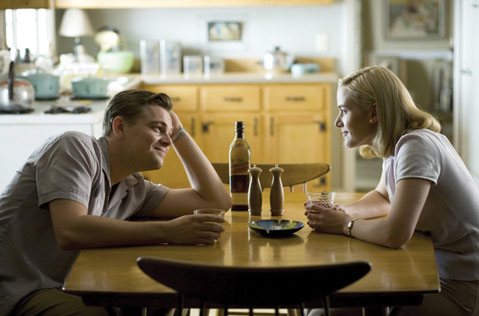Revolutionary Road
Kate Winslet and Leonardo DiCaprio star in a film written by Justin Haythe, based upon the novel by Richard Yates, and directed by Sam Mendes.

Sam Mendes distinguished himself by skewering suburban life with 1999’s American Beauty, probably painting his masterpiece his first time out as a director. With Revolutionary Road, Mendes returns to suburbia, albeit of a period piece variety-Connecticut in the mid ’50s-and delivers another artful and dazzling blow to life in the ‘burbs, this time with his wife, Kate Winslet, commanding the screen as a woman in the throes of coming undone.
Alas, the Golden Globes are not always wrong: We’re in a season when Winslet owns the screen between this powerful performance and an equally compelling role in The Reader. Here, she plays a pretty wife and mother who dreams of leaving the ‘burbs for life in Paris. Her husband (Leonardo DiCaprio) departs daily for a dull cubicle job in the city (and multi-martini lunches and trysts with the secretarial pool). They live on Revolutionary Road, in a life contrary to anything revolutionary.
Marketing-wise, the film plays off the return engagement of the Winslet/DeCaprio team, last seen together in Titanic. But with the new film, some 12 years later, the droopy romanticism of that box office behemoth is swapped for a more subversively dark investigation of human hearts in peril.
Mendes works some kind of miracle of understatement with the film, keeping a close watch on the pacing of the story and regulating the subterranean forces bubbling beneath the manicured lawns and claustrophobic, dust-free rooms. An unstable man on furlough from the “funny farm” (Michael Shannon), who plays the son of their real estate agent (Kathy Bates), serves as a cynical truth teller who upsets the prim complacency and squeaky clean surfaces of bedroom community life. Trouble is ahead.
If American Beauty had a baroque flair, Revolutionary Road takes a cooler, almost minimalist path. But it nonetheless dives deep, delivering a feminist message and leaving us in a state of benumbed awe, subtly navigated by Mendes and his allies on all sides of the camera. The great cinematographer Roger Deakins’s visual scheming is brilliant and integral to the film’s ugly beauty: a shot of blood on a freshly Hoover-ed carpet says more than words ever could.
Film can have uncanny access to pressing and distressing human issues, but rarely achieves this disarming depth. Suburbia, consider yourself warned.



